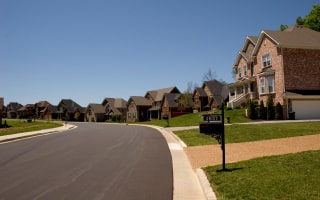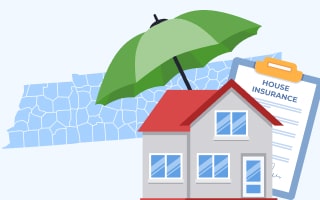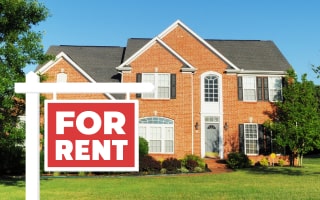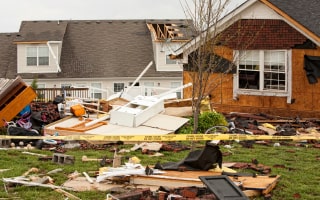Homeowners Insurance in Tennessee

Home of Dollywood, Tennessee whiskey, and the Smoky Mountains, Tennessee sits at the top of the Southeastern part of the U.S., making it prone to tornadoes, landslides, earthquakes, floods, and hurricanes. Natural disasters like these can destroy property, causing expensive claims and insurer losses. Since 1953, Tennessee has had 69 federally declared disasters, and the rate of disasters per 1 million people is 9.58.
Along with claims for hurricane damage, Tennessee property owners also file claims for water damage caused by burst pipes and leaky plumbing, fire, theft, liability issues, and vandalism.
Although there is no federal or state requirement for homeowners insurance, industry experts strongly suggest that all property owners have at least some coverage. If you borrow money to buy a house in Tennessee, your lender will require you to purchase and keep specific coverage limits on the property until you pay off the loan.
As of October 2024, the national average for homeowners insurance is $2,728 a year or $227 monthly. Tennessee residents pay an average of $3,175 annually, a bit more than the national average.
Types of Homeowner Insurance Coverage Available in Tennessee
Every homeowners insurance provider decides which states to offer coverage in and what levels of coverage based on the expected perils and claims. The available types of coverage in Tennessee include:
-
Dwelling: Dwelling coverage pays to repair or replace your home in the event of a disaster like a fire. It covers things like the walls, roof, foundation, and structural elements.
-
Liability: Liability protection pays your legal bills if someone gets hurt on your property and sues you.
-
Personal Property: If your personal belongings get stolen or destroyed in a disaster, this insurance will pay to replace them.
-
Guest Medical Payments: If someone gets injured on your property, this coverage pays their medical bills.
-
Other Structures: If your fence, detached garage, or shed gets destroyed, this coverage will pay to replace it.
-
Additional Living Expenses (ALE): After an event, if you must leave the house while it is being repaired or rebuilt, this coverage will pay for your expenses (food, lodging, travel, etc.).
Insurance providers in Tennessee recommend that homeowners also add coverage for floods, which is extra and only offered by some insurance companies. They should also consider an umbrella policy to fill in any gaps in coverage.
FEMA (Federal Emergency Management Agency) manages the National Flood Insurance Program (NFIP) through a network of 50 providers across the U.S.
Since most homeowners insurance does not cover floods, this supplemental coverage can repair damage and replace items after a flood. It can cover the building and/or your personal belongings, depending on your options. This program is available to homeowners, renters, and businesses. Learn more about the program on FEMA's website.
Home Insurance and Natural Disasters
Global warming has resulted in radical climate change, which is causing more frequent severe weather events, resulting in property damage and costly insurance claims. Severe weather and climate change are the number one factors affecting home insurance rates today. Across the U.S., home insurance rates have increased by an average of 34% and as much as 60% in some areas. In Tennessee, homeowners insurance rates have increased by 23.2%, which is less than most states.
Tennessee is subject to some pretty extreme weather like tornadoes, landslides, earthquakes, floods, and hurricanes. These situations can damage property extensively, costing insurers a lot of money. A fire or lightning damage claim costs insurance providers an average of $77,340. Water damage costs an average of $11,650, and windstorms an average of $11,695. From 2015 to 2019, Tennessee insurers lost a total of $1,007,537,400. From 1980 to 2024, Tennessee had 112 billion-dollar disasters. Tennessee averages 31 tornadoes every year. In 2022, Tennessee had 1,225 wildfires, a 122.7% increase from 2021.
How Can I Save on Homeowner Insurance Premiums in Tennessee?
With crazy weather becoming more prevalent these days, homeowners must find ways to save on their home insurance. The first thing to do is understand what factors impact home insurance rates and then adjust from there. The factors that impact home insurance in Tennessee include:
-
Location of the Home: The most crucial factor is the location of your home. If you live in an area prone to wild weather, like frequent hurricanes or tornadoes, or if you live in a high-crime area like the city, your rates will be much higher than those of someone who lives in a mild-weather area with low crime.
-
Size of the Home: The larger the home, the more expensive it will be to rebuild and the higher your rates.
-
Condition of the Home: Well-maintained homes cost less to insure than those in poor condition with old infrastructure, which poses more risk.
-
Financed or Owned: If you own your own home, your rates will be cheaper, and you can choose how much coverage you need. If you finance your home, your lender will determine your coverage levels.
-
Coverages: The more coverage you purchase, the higher your rates will be.
-
Deductible: The lower your deductible, the higher your rates will be, and visa versa.
-
Risks: If your property has many risks, such as a pool, hot tub, or trampoline, you will pay more than if it doesn't.
-
Claims History: If you have many claims on your file, your rates will be higher (even as much as 20% higher after one claim) than those without any claims.
-
Cost of Materials and Labor: As the costs of materials and labor increase, so do insurance rates. Your rates may be lower if your home is built with fire-retardant code-compliant materials.
-
Credit Score: People with good credit scores earn better rates than those with poor credit.
Some ways to save on Tennessee homeowners insurance include:
- Shop Around: Shop around and get multiple quotes before applying. Ask for recommendations from family, friends, and associates.
- Improve Your Credit: Boost your credit score and keep it high to earn lower insurance rates.
- Remove Risks: Get rid of risky items and alert your insurance agent so they can adjust your rates.
- Ask for Discounts: Ask your provider for discounts that apply to you.
- Increase Your Deductible: Increase your deductible as much as possible to lower your rates.
- Bundle Policies: Bundle your home and auto insurance policies together to get a break on your premiums.
- Beef Up Safety: Add sprinklers, smoke alarms, and fire extinguishers to reduce your fire risk and make your home safer. Your provider will discount you if you do.
- Improve Security: Install a security system with monitoring devices that also alert the policy and emergency professionals for discounts.
- Make Your Home Storm-Ready: Install hurricane shutters, shatterproof windows, and a stronger roof to get lower rates on your home insurance.
- Don't File Small Claims: Hold off on filing claims for small stuff. Every filed claim will affect your rates.
Home Insurance Discounts in Tennessee
Home insurance is a policy that protects you financially if a disaster occurs that damages your home. After a disaster like a fire, your insurance provider will pay to repair or completely rebuild the house, restoring it to its previous condition. However, each policy comes with limits, and expensive items or anything that falls outside those limits will not be covered. Home insurance includes dwelling coverage for the structure, personal property coverage that protects your belongings, liability, medical payments, other structures, and loss of use (ALE) coverage.
It's easy to get a new policy. First, find an insurance carrier that you like. You can apply by calling their 800 number, speaking with an agent, or applying online through their website. Some have calculators to help you determine your coverage needs. You can also find a local agent with whom you want to work. You may get more personalized service and help selecting the right coverage for your situation. You will need to pay for the first year in advance. After that, you can pay annually or through your monthly mortgage escrow if you financed the house.
Some of the most common home insurance discounts offered by most carriers are:
- Early Quote Discount: Get a quote well before you need it and earn a discount.
- Claims-Free Discount: Go claims-free for as long as possible and earn a discount from your provider.
- Non-smoker Discount: Non-smokers earn an automatic discount for being less risk of a fire.
- Green Discount: Installing green appliances and other household systems can lower your rates.
- Safety Discounts: Install fire safety items or a security system; your carrier may offer you a discount.
- Multi-policy Discounts: Bundle multiple policies with the same insurer and get better rates.
- Employee Discounts: Government employees and certain professionals like firefighters and teachers earn discounts on home insurance.
- Military Discounts: Insurance providers give military members a discount on home insurance.
- Restoration Discounts: When you restore an older home, bring it up to code, and make it safer, you get a discount.
- Autopay or Paperless Discount: Sign up for autopay or paperless statements, and your insurance company should give you a discount.
- Retiree Discount: Senior citizens often get a discount on their insurance.
- Smart Home Discount: Smart home devices can help detect problems and avoid disasters and claims. Your insurer will give you a discount for installing them.
- Loyalty Discount: If you have been loyal to the same company for many years, you will receive a discount.
Common Rates Offer by Homeowners Insurance Firms
New homes cost far less to insure than older homes. Sometimes, you can save up to 40% or even 26% if the house is five years old or younger. Newer homes are constructed according to current building codes using more fire-resistant materials, making them easier to rebuild after a disaster. In Tennessee, owners of new homes pay an average of $2,155 a year. Of course, your actual rates will depend on your age, credit score, insurance firm, and other factors.
Top 10 Home Insurance Firms in Tennessee and Average New Home Savings
| Company | % savings |
|---|---|
| Nationwide | 76% |
| USAA | 54% |
| Auto-Owners | N/A |
| State Farm | 51% |
| Erie Insurance | 51% |
| Foremost Insurance Group | N/A |
| Progressive | N/A |
| Grange | 58% |
| Westfield | N/A |
| Allstate | 47% |
Home Insurance and Renovations in Tennessee

Home renovations can drastically improve the aesthetics of your home and increase value, but they also impact your home insurance rates. Some upgrades increase value but also risk causing your rates to rise. Others may lower your risk and rates, while others do both simultaneously, canceling any increase or decrease.
![]() Home Renovations that Increase Rates
Home Renovations that Increase Rates
Some home renovations that increase your rates include:
- Adding a Room: Adding more room to make everyone feel comfortable is great, but it adds more space and value and will cost more to insure.
- Remodeling: Upgrading your outdated flooring, carpets, appliances, and light fixtures can add beauty and value to your home, but it will also increase the cost of your home insurance. The more luxury, the higher the price.
- Adding a Fountain: A fountain can add an air of elegance to your property, but it is also a risk and will cost more to insure.
![]() Home Renovations that Decrease Rates
Home Renovations that Decrease Rates
Some home renovations that decrease your rates include:
- Update the Infrastructure: Updating your home's infrastructure (foundation, roof, wiring, plumbing, and HVAC systems) can strengthen your home and make it safer and more valuable. Being proactive will also lower your rates.
- Earthquake Resistance Retrofits: Anyone who lives in an earthquake-prone area should reinforce their home with straps, ties, and shatterproof windows. Insurers also reward you with money off your premiums.
- Water Alarms and Auto Shut-Off Devices: Water damage is expensive. You can avoid this costly peril by installing automatic water shut-off devices and alarms and lowering your home insurance rates.
Home insurance does not pay for regular home maintenance or upgrades that you decide to make. It only pays for repairs or replacement of your house after a qualifying event. If, during renovations, someone steals from you or gets hurt, those things are covered. Other things that home insurance does not pay for are rodents, pest infestations, and animal damage.
Always speak to your insurance agent before making any major renovations. They will help you understand the impact on your rates and coverage. Your agent may want to inspect the work once it is done to re-evaluate your limits.
Tennessee Renters' Insurance

Tennessee renters also need financial protection in their homes. They protect themselves with renters insurance. Renters' insurance differs from homeowners in that it does not contain any dwelling coverage. That is covered under the property owner's policy. The main goal of renters insurance is to protect your personal property. If your belongings are stolen or destroyed after a covered event, renters insurance will pay to replace them up to your coverage limits. If you have expensive items like jewelry, furs, or collectibles, they may not be covered. Renters insurance also includes liability, medical payments, and loss of use coverage.
Some covered perils include:
-
Smoke
-
Fire
-
Windstorms
-
Hail
-
Theft
-
Vandalism
Some of the items that renters insurance covers are:
-
Small Appliances
-
Furniture
-
Clothing
-
Bedding
-
Bath Items
-
Electronics
-
Sporting Equipment
Renters insurance is priced according to three main factors, and they are:
-
Location: Even as a renter, your location matters. If you live in the city, you will pay more than if you live in the country. If your area has many weather events, you will pay higher rates.
-
Coverage Amount: The more coverage you buy, the higher your premiums.
-
Number of Units: The more units in your building, the lower your rates.
The national average for renters insurance is between $15 and $20 monthly. Tennessee renters pay an average of between $$14.67 and $24 a month.
Condo Insurance in Tennessee

Condo owners in Tennessee also need homeowners insurance. Condo insurance, also known as HO-6, is slightly different, though. Condo associations have master policies that protect the dwelling. After a covered disaster, that insurance will pay to replace the building and restore it to its original condition (when it was first built). However, that may not include any upgrades to flooring, appliances, kitchens, and baths made by subsequent owners. HO-6 insurance restores the condo's interior back to its most recent condition with all the updates. Condo insurance also includes liability, medical payments, personal property, loss of use, and loss assessment coverage.
Unlike renters insurance, condo insurance has dwelling coverage, but it only covers the interior, referred to as "walls-in". Plus, the liability insurance only covers people who are injured inside the condo, not outside or on common grounds.
After a fire, windstorm, theft, or other disaster, condo insurance pays to replace the following items:
- Appliances
- Flooring
- Interior Walls
- Wiring
- Plumbing
- Light Fixtures
- Cabinets
- Countertops
- Personal Belongings
Tennessee condo owners pay an average of $455 a year, which is much less than the national average of $625 for $60,000 in personal property coverage, $300,000 of liability, and a $1,000 deductible.
Some ways to save on condo insurance include:
- Shop Around/Ask for Recommendations
- Raise Your Deductible
- Bundle Your Policies
- Install Security/Safety Devices
- Improve Your Credit
- Sign Up for Auto Payments or Paperless Billing
- Ask for Discounts
Tennessee Home Insurance Market
American home insurance providers are hemorrhaging money due to climate change and frequent natural disasters. In many states, providers have limited coverage or have decided to stop operations altogether, thus slimming competition. Some have canceled high-risk customers. In Tennessee, homeowners insurance profits are declining rapidly, and in 2023, the state suffered ten catastrophic storms, causing extreme losses.
Tennessee has the potential for tornadoes, landslides, earthquakes, floods, and hurricanes, all of which can devastate property and cause insurers huge claims and losses. As these conditions worsen, homeowners will have trouble finding coverage or may have to pay for damages themselves.
States, rather than the federal government, regulate the home insurance industry. They appoint a department or agency to monitor providers and rates, handle customer complaints, perform investigations, and sanction guilty firms. In Tennessee, that agency is the Department of Commerce and Insurance, located at 500 James Robertson Parkway, 5th Floor, Nashville, TN 37243.
Homeowners Insurance Guide
- Homeowners Insurance in Tennessee
- Types of Homeowner Insurance Coverage Available in Tennessee
- Home Insurance and Natural Disasters
- How Can I Save on Homeowner Insurance Premiums in Tennessee?
- Home Insurance Discounts in Tennessee
- Home Insurance and Renovations in Tennessee
- Tennessee Renters' Insurance
- Condo Insurance in Tennessee
- Tennessee Home Insurance Market
Instant Access to Tennessee Property Records
- Owner(s)
- Deed Records
- Loans & Liens
- Values
- Taxes
- Building Permits
- Purchase History
- Property Details
- And More!
Homeowners Insurance Guide
- Homeowners Insurance in Tennessee
- Types of Homeowner Insurance Coverage Available in Tennessee
- Home Insurance and Natural Disasters
- How Can I Save on Homeowner Insurance Premiums in Tennessee?
- Home Insurance Discounts in Tennessee
- Home Insurance and Renovations in Tennessee
- Tennessee Renters' Insurance
- Condo Insurance in Tennessee
- Tennessee Home Insurance Market